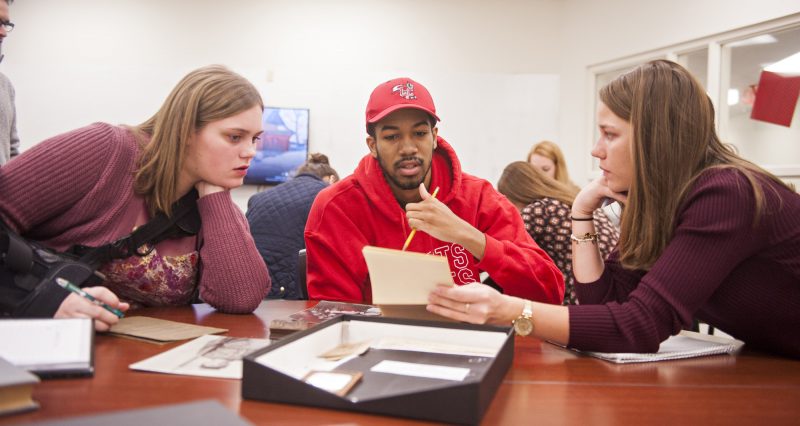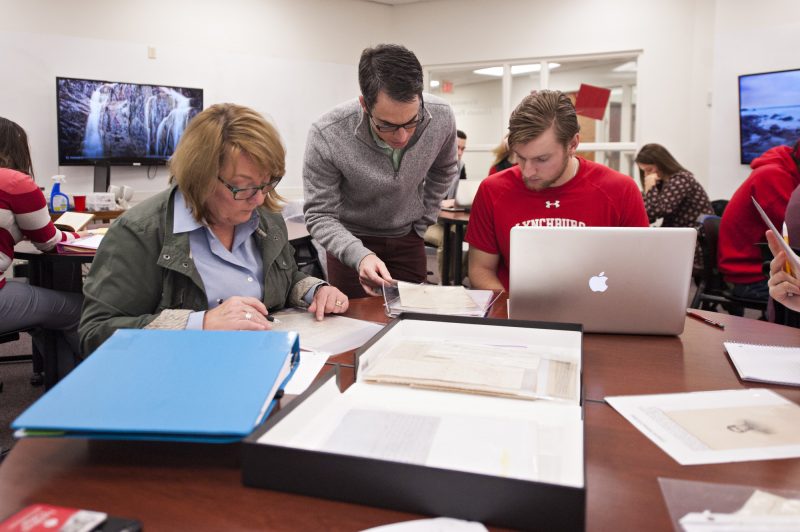Every Friday, a group of University of Lynchburg students peer closely at small pieces of people’s lives from the Civil War era.
Word by word, they transcribe script writing from 150-year-old letters and diaries, and they study the details of photographs. A letter from a Confederate prisoner of war reveals his distress at hearing of Robert E. Lee’s surrender. A portrait of a soldier shows a stern impression.
 Later this year, the entire collection of documents will be available online for history buffs and researchers alike.
Later this year, the entire collection of documents will be available online for history buffs and researchers alike.
“History class is usually about reading a book and discussion of history, not handling material from the time period,” said University of Lynchburg History professor Dr. Dean. “But these students have the opportunity to do the work of historians.”
The project came about when the Greater Lynchburg Community Trust awarded a $4,000 grant to Historic Sandusky — a 19th century home best known for serving as Union headquarters during the 1864 Battle of Lynchburg — to help digitize the organization’s library of historical documents. Greg Starbuck ’14 MA, executive director of Historic Sandusky, asked Dr. Dean if he would like to get his students involved, and Dr. Dean made it a project for his Westover Honors class “Common Soldiers of the Civil War.”
Friday classes are devoted to studying and transcribing the documents. Four students have taken on additional work by scanning the original pages to create the digital exhibition. The hands-on history work is teaching the students valuable skills that museums and research organizations look for in employees, such as handling historic documents and creating websites to teach others about history.
 In addition to the more well-known documents related to the Hutter family, which owned Sandusky during the Civil War, the students are studying papers from the Bell family, who lived elsewhere in Lynchburg at the time. These papers have never been studied before, so they provide rich, fresh narratives of life in Lynchburg and on the battlefront. “These are the records of people who are not famous in history books but experienced the Civil War and destruction of slavery on an intimate level.” Dr. Dean said.
In addition to the more well-known documents related to the Hutter family, which owned Sandusky during the Civil War, the students are studying papers from the Bell family, who lived elsewhere in Lynchburg at the time. These papers have never been studied before, so they provide rich, fresh narratives of life in Lynchburg and on the battlefront. “These are the records of people who are not famous in history books but experienced the Civil War and destruction of slavery on an intimate level.” Dr. Dean said.
The students are discovering a lot of documents with medical care in Lynchburg during this era and people’s experiences as prisoners of war. There were documents found that the confederate government would force slaves to work on fortifications around important cities and slaves used this to escape to Union Lines.
“This project has really shown me a more human side to the history of the Civil War,” said Laura Meisner ’17, one of the students who works on scanning the documents. “You always hear about the battles and the big-name generals, but to read the letters and diaries of regular people who were actually there, and to see photographs that connect a face to their words, really makes it come alive.”
A history major minoring in art history and museum studies, Laura has worked on art exhibitions in the Daura Gallery before. She said it is important to study and preserve artifacts like Civil War-era letters so people can have a fuller picture of the past. “Understanding history is integral to understanding things that happen today and to making decisions about the future,” she said.


